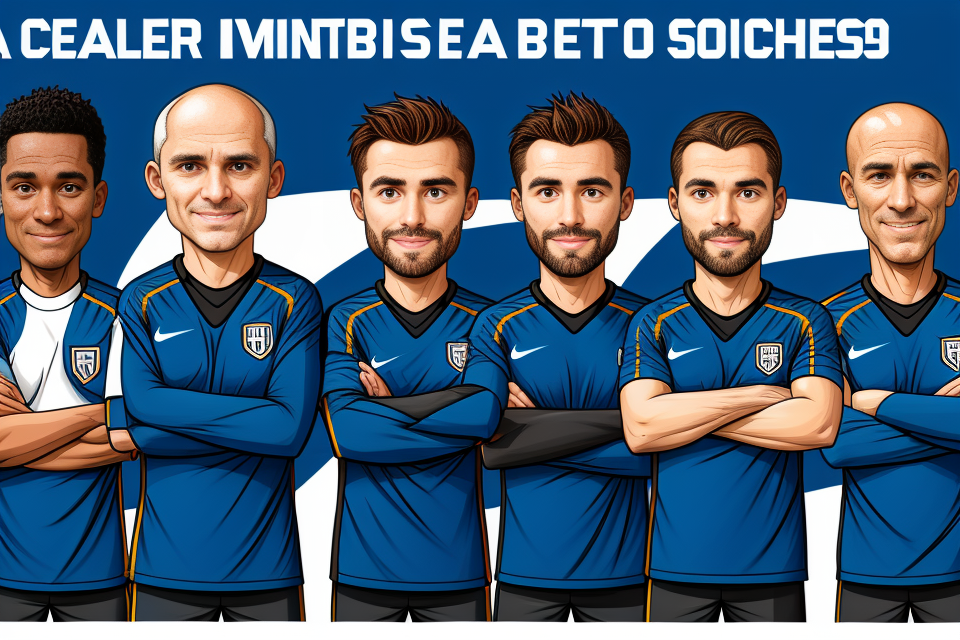Are you a passionate soccer player looking to take your love for the game to the next level? Are you interested in coaching and guiding young athletes to reach their full potential? Becoming a soccer coach in California can be an exciting and rewarding opportunity for those who are dedicated to the sport. In this article, we will explore the steps you need to take to become a certified soccer coach in California, including the necessary qualifications, training programs, and certifications required. Get ready to learn about the exciting journey of becoming a soccer coach in the Golden State!
Requirements for Becoming a Soccer Coach in California
Education and Experience
Becoming a soccer coach in California requires a combination of education and experience. Here are the specific requirements:
- High school diploma or equivalent: You must have a high school diploma or equivalent to be eligible to become a soccer coach in California. This is the minimum educational requirement for coaching at any level.
- Successful completion of a nationally recognized soccer coaching course: To become a soccer coach in California, you must complete a nationally recognized soccer coaching course. The most popular courses include the United States Soccer Federation (USSF), the National Soccer Coaches Association of America (NSCAA), and FIFA. These courses provide comprehensive training in various aspects of soccer coaching, including tactics, technique, and physiology.
- Prior playing or coaching experience at the youth or collegiate level: Having prior playing or coaching experience at the youth or collegiate level is highly desirable for aspiring soccer coaches in California. This experience can provide valuable insights into the game and help you develop the necessary skills to coach at a higher level. Additionally, it can demonstrate your commitment to the sport and your ability to work with players of different ages and skill levels.
Certification
In order to become a soccer coach in California, one must meet certain certification requirements. These requirements are set forth by the United States Soccer Federation (USSF) and include obtaining a minimum of a USSF “D” coaching license, completing first aid and CPR certification, and passing a background check.
USSF “D” Coaching License
The USSF “D” coaching license is the minimum requirement for becoming a soccer coach in California. This license is designed to provide coaches with the fundamental knowledge and skills necessary to coach soccer at the youth level. To obtain this license, coaches must complete a combination of online and in-person courses, pass a written exam, and complete a practical evaluation.
First Aid and CPR Certification
First aid and CPR certification is required for all soccer coaches in California. This certification ensures that coaches are prepared to handle medical emergencies that may arise during practice or games. There are many organizations that offer first aid and CPR certification courses, including the American Red Cross and the American Heart Association.
Background Check
In order to coach soccer in California, coaches must also pass a background check. This check is designed to ensure that coaches have no history of criminal activity or other behaviors that may be detrimental to the safety and well-being of the players they coach. The background check typically includes a review of the coach’s criminal history, driving record, and any other relevant information.
Steps to Becoming a Soccer Coach in California
1. Gain Experience
- Volunteer or assistant coach at the youth or high school level
- Attend coaching clinics and workshops
- Network with other coaches and organizations
Volunteer or Assistant Coach at the Youth or High School Level
One of the best ways to gain experience as a soccer coach in California is to volunteer or become an assistant coach at the youth or high school level. This will allow you to work with players of different ages and skill levels, learn from experienced coaches, and develop your coaching skills.
You can start by contacting local youth soccer clubs or high school coaches to inquire about volunteer or assistant coaching opportunities. You can also consider coaching a recreational team or starting a pick-up game with friends and neighbors.
Attend Coaching Clinics and Workshops
Another way to gain experience as a soccer coach in California is to attend coaching clinics and workshops. These events are organized by various organizations, including the California Youth Soccer Association (CYSA) and the United States Soccer Federation (USSF).
Attending coaching clinics and workshops will help you learn about the latest coaching techniques, develop your coaching skills, and network with other coaches. You can find information about upcoming coaching clinics and workshops by visiting the websites of the CYSA and the USSF, or by contacting your local soccer organization.
Network with Other Coaches and Organizations
Networking with other coaches and organizations is an important aspect of becoming a successful soccer coach in California. You can attend coaching clinics and workshops, join local soccer organizations, and participate in online forums and social media groups to connect with other coaches and learn from their experiences.
By networking with other coaches, you can learn about new coaching techniques, get advice on dealing with challenging situations, and stay up-to-date on the latest trends and developments in soccer coaching. You can also join local soccer organizations, such as the CYSA or the USSF, to access resources, attend events, and get involved in the soccer community.
2. Obtain Certification
To become a soccer coach in California, you must obtain certification from the United States Soccer Federation (USSF) and the California Youth Soccer Association (CYSA). Here are the specific steps you need to take:
- Register for and complete the USSF “D” coaching license course: This is the entry-level certification for soccer coaches in the United States. The course covers basic coaching principles, such as team management, player development, and practice planning. To register for the course, you must be at least 16 years old and have a current Adult CPR/AED certification. The course is typically offered online and in-person, and it takes approximately 20 hours to complete.
- Complete the California Youth Soccer Association’s (CYSA) “SafeSport” training: This training is mandatory for all soccer coaches in California who work with youth players. It covers topics such as abuse prevention, recognizing and reporting abuse, and creating a safe environment for players. The training is offered online and must be completed before you can coach a CYSA-affiliated team.
- Pass a background check: California law requires that all soccer coaches who work with youth players pass a background check. The check is conducted by the CYSA and includes a review of your criminal history, driving record, and sex offender registry status. If you have any convictions or charges pending against you, you may not be eligible to coach.
3. Find a Team or Organization to Coach
- Contact local youth soccer clubs and organizations
- Research and make a list of youth soccer clubs and organizations in your area.
- Reach out to the respective clubs and organizations to inquire about available coaching positions.
- Highlight your qualifications, experience, and passion for coaching soccer.
- Reach out to high schools and colleges in your area
- Identify high schools and colleges in your area that have soccer programs.
- Contact the athletic director or soccer coach to express your interest in coaching.
- Provide information about your coaching qualifications and experience.
- Consider starting your own team or program
- If you are unable to find a coaching position with an existing team or organization, consider starting your own team or program.
- Research and identify a need for soccer programs in your area.
- Develop a business plan and budget for your team or program.
- Recruit players and secure a location for practices and games.
- Obtain necessary permits and insurance coverage for your team or program.
4. Continuously Develop Your Skills
Becoming a successful soccer coach in California requires a commitment to continuous learning and development. Here are some ways to continuously develop your skills as a soccer coach:
Attend additional coaching courses and workshops
There are many coaching courses and workshops available in California that can help you improve your skills as a soccer coach. These courses can cover a wide range of topics, including tactics, technique, fitness, and nutrition. Attending these courses can provide you with valuable insights and knowledge that can help you become a better coach.
Stay up-to-date on the latest soccer training techniques and strategies
The world of soccer is constantly evolving, and it’s important to stay up-to-date on the latest training techniques and strategies. This can involve reading books and articles, watching videos, and attending conferences and seminars. By staying informed about the latest developments in soccer training, you can ensure that you are providing your players with the best possible coaching.
Network with other coaches and organizations to share ideas and experiences
Networking with other coaches and organizations can be a valuable way to learn from others and share ideas and experiences. This can involve joining local soccer clubs and organizations, attending coaching conferences and events, and participating in online forums and discussion groups. By connecting with other coaches, you can gain new insights and perspectives that can help you become a better coach.
Responsibilities of a Soccer Coach in California
Developing Player Skills
As a soccer coach in California, developing player skills is a crucial aspect of your responsibilities. To effectively develop player skills, there are several key tasks that you should focus on:
- Designing and implementing training sessions: You should design training sessions that are tailored to the needs of your players. This includes creating drills and exercises that target specific skills and techniques, such as dribbling, passing, and shooting. It’s important to keep training sessions challenging, yet fun, to keep players engaged and motivated.
- Evaluating player progress and performance: Regularly evaluating player progress and performance is essential to determine whether players are improving and to identify areas where they need additional support. This can be done through a variety of methods, such as observation, feedback from players, and keeping records of player performance.
- Providing feedback and encouragement to players: Providing constructive feedback and encouragement to players is critical to their development. You should focus on highlighting what players are doing well, while also providing specific and actionable feedback on areas where they can improve. It’s important to create a positive and supportive environment that fosters growth and helps players build confidence in their abilities.
Managing Games and Tournaments
As a soccer coach in California, managing games and tournaments is a crucial aspect of your role. You will be responsible for developing game strategies, communicating with referees and other coaches, and managing player substitutions and injuries.
- Developing game strategies: As a soccer coach, you will need to develop game strategies that will help your team win matches. This will involve analyzing the strengths and weaknesses of your team, as well as your opponents, and devising tactics that will exploit the weaknesses of the opposition while minimizing the impact of your team’s weaknesses.
- Communicating with referees and other coaches: Communication is key in any team sport, and as a soccer coach, you will need to communicate effectively with referees and other coaches. This will involve understanding the rules of the game, as well as the protocols for communicating with officials. You will also need to be able to communicate effectively with your own players, ensuring that they understand their roles and responsibilities on the field.
- Managing player substitutions and injuries: During games and tournaments, you will need to manage player substitutions and injuries effectively. This will involve knowing when to make substitutions, as well as understanding the rules around player injuries and how to manage them. You will also need to be able to communicate effectively with your players and other team members to ensure that everyone is aware of any changes or updates to the team’s strategy or tactics.
Overall, managing games and tournaments is a critical aspect of being a soccer coach in California. By developing effective game strategies, communicating effectively with referees and other coaches, and managing player substitutions and injuries effectively, you can help your team perform at its best and achieve success on the field.
Building a Positive Team Culture
As a soccer coach in California, it is crucial to establish a positive team culture that fosters a supportive and inclusive environment for all players. Here are some key elements to consider when building a positive team culture:
Fostering a Positive and Supportive Team Environment
A soccer coach in California should create a team environment that is positive and supportive. This includes encouraging open communication, actively listening to players’ concerns, and creating a sense of camaraderie among team members. A coach can achieve this by organizing team-building activities, promoting a culture of respect, and celebrating individual and team achievements.
Encouraging Teamwork and Sportsmanship
Soccer is a team sport, and as a coach, it is essential to emphasize the importance of teamwork and sportsmanship. This includes promoting fair play, respecting the rules of the game, and encouraging players to support one another both on and off the field. A coach can encourage teamwork and sportsmanship by setting clear expectations, modeling appropriate behavior, and providing positive reinforcement for players who demonstrate these values.
Dealing with Conflicts and Challenges
As with any team, conflicts and challenges will inevitably arise. As a coach, it is important to be proactive in addressing these issues and to provide players with the tools they need to resolve conflicts constructively. This may include providing guidance on effective communication, active listening, and conflict resolution strategies. Additionally, a coach should model empathy and respect when dealing with conflicts, and ensure that all players feel heard and valued.
Overall, building a positive team culture is essential for the success of any soccer team. By fostering a supportive and inclusive environment, encouraging teamwork and sportsmanship, and addressing conflicts and challenges in a proactive and empathetic manner, a coach can help to create a positive and successful team culture that benefits all players.
Compliance with Rules and Regulations
As a soccer coach in California, it is essential to understand and adhere to the rules and regulations that govern the sport. These rules and regulations are put in place to ensure the safety and well-being of the players, as well as to maintain fairness and equality within the sport. Here are some of the key responsibilities that a soccer coach in California needs to be aware of when it comes to compliance with rules and regulations:
Ensuring Compliance with League Rules and Regulations
As a soccer coach in California, it is your responsibility to ensure that your team and its players comply with the rules and regulations of the league in which they are participating. This includes understanding and adhering to the rules regarding player eligibility, game schedules, and player conduct, among others. It is important to familiarize yourself with the league’s rules and regulations and to communicate these to your players and their parents.
Completing Necessary Paperwork and Documentation
As a soccer coach in California, you will be required to complete various forms of paperwork and documentation throughout the season. This may include player registration forms, game sheets, and roster sheets, among others. It is important to ensure that all paperwork is completed accurately and submitted on time to avoid any penalties or sanctions.
Adhering to the California Youth Soccer Association’s (CYSA) “SafeSport” Policies
In addition to the league rules and regulations, soccer coaches in California must also adhere to the California Youth Soccer Association’s (CYSA) “SafeSport” policies. These policies are designed to promote a safe and positive environment for all soccer players in California, and they include guidelines regarding sexual abuse prevention, misconduct reporting, and other important areas. It is important to familiarize yourself with the CYSA’s “SafeSport” policies and to ensure that you and your team comply with these policies at all times.
Overall, compliance with rules and regulations is a critical aspect of being a soccer coach in California. By understanding and adhering to the league rules and regulations, completing necessary paperwork and documentation, and following the CYSA’s “SafeSport” policies, you can help ensure a safe and positive experience for your players and contribute to the overall success of the sport in California.
Challenges and Rewards of Being a Soccer Coach in California
Challenges
- Balancing coaching responsibilities with other commitments
Being a soccer coach in California can be a rewarding experience, but it also comes with its fair share of challenges. One of the biggest challenges is balancing coaching responsibilities with other commitments such as work, family, and personal life. This can be especially difficult for coaches who have other full-time jobs or who are responsible for taking care of their families.
- Dealing with difficult players or parents
Another challenge that soccer coaches in California may face is dealing with difficult players or parents. It can be challenging to manage the expectations of players and parents who may have different ideas about what it means to be a successful soccer team. Coaches may need to navigate difficult conversations and find ways to balance the needs and expectations of different stakeholders.
- Managing stress and burnout
Finally, soccer coaching can be a stressful and demanding job, and coaches may need to find ways to manage stress and avoid burnout. This may involve setting boundaries, prioritizing self-care, and finding ways to stay motivated and engaged in the sport. Coaches who are able to manage stress and avoid burnout are more likely to be successful in the long term.
Rewards
- Watching players improve and achieve their goals
- One of the most rewarding aspects of being a soccer coach in California is witnessing the growth and development of your players. Seeing them improve their skills, gain confidence, and achieve their goals is an incredibly fulfilling experience. It’s a privilege to be a part of their journey and to help them reach their full potential as soccer players.
- Building lasting relationships with players and their families
- Another benefit of coaching soccer in California is the opportunity to form strong bonds with your players and their families. Soccer is a team sport, and it’s essential to create a supportive and positive environment where everyone feels valued and respected. By investing time and energy into your players, you can build trust and develop relationships that go beyond the soccer field. Many coaches find that these connections last a lifetime and enrich their lives in ways they never imagined.
- Being part of a supportive and passionate soccer community in California
- California is home to a vibrant and passionate soccer community, and being a part of it is a reward in itself. Whether you’re coaching at the youth or professional level, you’ll have the chance to connect with other coaches, players, and fans who share your love for the game. There are numerous soccer organizations and events throughout the state, providing ample opportunities to network, learn, and grow as a coach. Being part of this community can be a source of inspiration, motivation, and camaraderie, making your experience as a soccer coach in California even more enjoyable and fulfilling.
FAQs
1. What qualifications do I need to become a soccer coach in California?
To become a soccer coach in California, you do not need any specific qualifications. However, it is recommended that you have a passion for soccer and experience playing or coaching the sport. Additionally, it is beneficial to have a background in sports medicine, sports psychology, and sports training. You can also consider obtaining a coaching license from the United States Soccer Federation (USSF) to demonstrate your knowledge and expertise in the sport.
2. How do I obtain a coaching license from the USSF?
To obtain a coaching license from the USSF, you must first complete a background check and complete the required coursework. The coursework includes topics such as understanding the laws of the game, coaching style and philosophy, and injury prevention and management. You can take the coursework online or in-person, and you must pass a written exam to receive your license.
3. Are there any additional requirements to coach soccer in California?
Yes, in addition to obtaining a coaching license from the USSF, you must also complete a background check and provide proof of completion of a concussion management course. The background check is required by the California Interscholastic Federation (CIF), and the concussion management course is required by the California Department of Public Health.
4. How do I find job opportunities as a soccer coach in California?
There are several ways to find job opportunities as a soccer coach in California. You can start by contacting local youth organizations, high schools, and colleges to inquire about coaching positions. You can also search for job openings on websites such as Indeed, LinkedIn, and the CIF website. Additionally, you can network with other coaches and attend coaching conferences and workshops to learn about potential job opportunities.
5. What is the salary range for soccer coaches in California?
The salary range for soccer coaches in California varies depending on the level of competition and experience. According to the Bureau of Labor Statistics, the median annual wage for coaches and scouts in California was $47,160 in May 2020. However, coaches at the college level can earn significantly more, with some earning over $100,000 per year.



